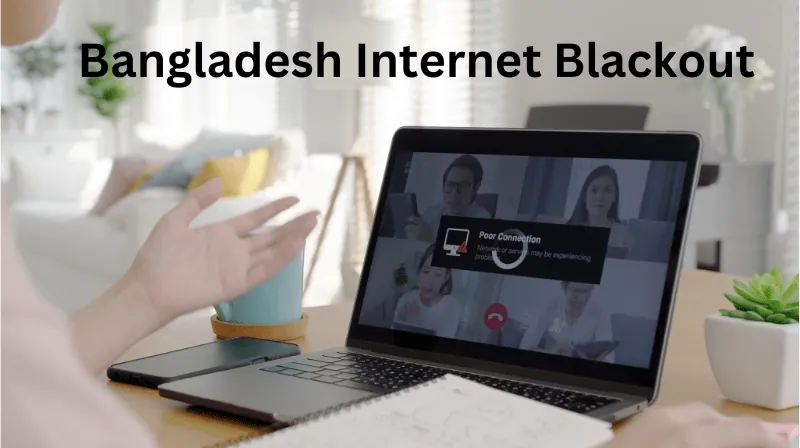In recent years, Bangladesh has experienced multiple instances of internet blackouts, a phenomenon that has attracted significant attention both locally and globally. While internet blackouts can occur in various regions around the world, they strike a particular chord in countries like Bangladesh where digital connectivity plays an essential role in daily life, commerce, education, and social interaction. This article explores the causes behind these blackouts, their impact on society, and what the future may hold for internet accessibility in Bangladesh.
What is an Internet Blackout?
An internet blackout refers to a temporary disruption or complete shutdown of internet services within a specific area or across an entire country. When a blackout occurs, users are unable to access the web, send or receive messages through social media, or communicate via VoIP services. Blackouts can happen due to various reasons, including natural disasters, undersea cable damage, government interventions, or network maintenance issues.
In Bangladesh, the internet blackout often occurs as a response to specific events. These can range from political unrest to public safety concerns, and even in the wake of examinations, when authorities aim to curb cheating.
The Context: Bangladesh’s Digital Landscape
Bangladesh, despite being one of the most densely populated countries in the world, has made remarkable strides in adopting digital technology. According to the Bangladesh Telecommunication Regulatory Commission (BTRC), the country had over 180 million mobile subscribers by mid-2021, a significant portion of whom use the internet.
As the digital landscape has evolved rapidly, the internet has become a vital part of daily life. Social media platforms have empowered citizens to participate in sociopolitical discourse, while e-commerce has gained traction, contributing to economic growth. With such reliance on the internet, any interruption can have far-reaching consequences.
Causes of Internet Blackouts in Bangladesh
- Government Interventions:
One of the primary reasons for internet blackouts in Bangladesh is government intervention. In recent years, the government has imposed internet restrictions during sensitive times, particularly surrounding protests, strikes, and civil unrest, to prevent the spread of misinformation or to control the narrative. For example, during the 2018 student protests demanding safer roads, the government imposed a temporary blackout to limit communication among protestors. - Examinations and Cheating Prevention:
The Bangladeshi government has also resorted to internet blackouts during public examinations to combat cheating and ensure the integrity of the testing process. In 2017, for instance, the authorities enacted internet shutdowns during the Secondary School Certificate exams to limit the sharing of leaked questions on social media. - Political Events:
During politically charged periods, such as elections or national crises, the government may choose to cut internet access as a means of controlling potential disturbances or preventing the mobilization of opposition groups. The 2014 national elections saw multiple instances of internet disruptions, highlighting the lengths to which authorities would go to maintain order. - Social Unrest:
Instances of social unrest, particularly those that pose a threat to public safety, can trigger internet blackouts. For example, during communal violence or riots, authorities may disable internet services to deter the mobilization of groups that could further escalate the situation.
Impact of Internet Blackouts
The ramifications of internet blackouts in Bangladesh are both immediate and long-lasting. Here’s a breakdown of the impact:
- Economic Loss:
The economic consequences of internet blackouts can be substantial. E-commerce companies, service providers, and telecommunications businesses face significant revenue losses during outages. Additionally, freelance workers and those relying on online platforms for income suffer immediate financial impacts. - Access to Information:
Information dissemination is severely hampered during blackouts. Citizens lose access to crucial news updates, emergency notifications, and educational resources. The inability to stay informed can exacerbate public panic, increase misinformation, and hinder essential services. - Public Safety Risks:
In times of crisis, such as natural disasters or civil unrest, a functioning internet is crucial for coordinating rescue efforts and disseminating safety information. Without it, efforts become fragmented, and lives may be at risk due to the inability to communicate effectively. - Erosion of Trust:
Continuous blackouts can erode public trust in government institutions. When citizens feel that their freedom to communicate is undermined, frustrations grow, potentially leading to increased resistance to authorities.
The Future of Internet Connectivity in Bangladesh
As the importance of the internet continues to grow, it becomes essential for the Bangladeshi government to develop policies that promote rather than restrict internet access. The future of connectivity in Bangladesh depends on several factors:
- Policy Reform:
Advocating for more transparent policies regarding internet usage during emergencies is essential. The government needs to balance security concerns with the public’s right to access information and use communication tools effectively. - National Infrastructure Improvement:
Investments in internet infrastructure can lay the groundwork for more resilient networks capable of withstanding outages. This not only allows for continuous access during adverse conditions but also enhances overall digital literacy. - Public Advocacy:
Citizens must lobby for their rights regarding internet freedom, while NGOs and civil society organizations play a pivotal role in raising awareness about the impacts of internet blackouts. These efforts can generate public discourse and encourage government action towards more equitable internet policies. - International Cooperation:
Bangladesh can learn from other countries’ experiences with internet governance. Collaborating with international bodies can lead to the establishment of best practices in managing and protecting citizens’ digital rights.
FAQs About Bangladesh Internet Blackouts
Q1: Are internet blackouts in Bangladesh common?
Yes, internet blackouts occur intermittently in Bangladesh, usually during politically sensitive events or periods of social unrest.
Q2: How long do these blackouts typically last?
The duration of internet blackouts in Bangladesh can vary from a few hours to several days, depending on the government’s assessment of the situation.
Q3: Is there a legal basis for government-imposed internet blackouts?
In Bangladesh, the government often cites national security and public safety as legal grounds for imposing internet blackouts, although this raises human rights concerns.
Q4: What are the economic impacts of internet blackouts in Bangladesh?
The economic impacts can be profound, affecting businesses that depend on online transactions, leading to significant revenue losses across various sectors.
Q5: What steps can be taken to prevent unnecessary blackouts?
Advocacy for digital rights, policy reform, and investment in robust communication infrastructure can help in minimizing unnecessary internet blackouts.
Conclusion
The phenomenon of internet blackouts in Bangladesh highlights the delicate balance between governance, public safety, and individual rights in the digital age. As technology continues to evolve and weave itself deeper into the fabric of society, the need for robust and equitable internet policies becomes ever more pressing. Understanding the causes and impacts of these blackouts is essential not only for citizens in Bangladesh but also for governments and policymakers striving to create a more connected, informed, and resilient society. Navigating the future of internet accessibility will require collaboration, awareness, and a commitment to maintaining open communication channels for all citizens.



